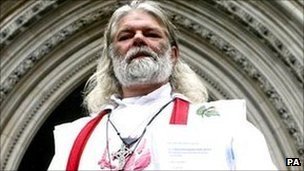A druid who has lost his second legal bid to get human remains reburied at Stonehenge has said he will fight on.

King Arthur Pendragon lost a High Court bid to have the bones reburied in 2011
King Arthur Pendragon claims the cremated bones discovered in 2008 are the remains of members of the royal line and wants them re-interred.
Having lost a High Court bid to have the bones reburied in 2011, permission to take the case to a full judicial review has also been refused.
But the druid leader said it was “by no means the end of the campaign”.
The cremated remains of more than 40 bodies, thought to be at least 5,000 years old, were removed from the burial site at the ancient stone circle in Wiltshire in 2008.
‘Broken up Weetabix’
But Mike Pitts, one of the archaeologists who found the remains, said they did not uncover “individual burials” but bone fragments that were “very small and damaged”.
“What we’re attempting to do is to isolate individual people, to recognise bits of bone that came from individuals, within this mass of bone that was just dumped in a mass like broken up Weetabix at the bottom of this pit,” he said.
“So studying these is an extremely detailed, time consuming and forensic process.”
Ministers gave permission to allow the bones to be examined at Sheffield University until 2015.
But Mr Pendragon has vowed he will continue his fight to have the remains reburied.
“The judge in refusing to let me take this particular case did say that if they [the remains] do not go back in the ground in 2015 – which the current licence says they’ve got to be – that I will take another case against them,” he said.
“And the judge has given me permission to do that.”
Source: http://www.bbc.co.uk/news/uk-england-wiltshire-22558293
Stonehenge Tourist Guide, Salisbury
They were once caricatured as be-robed bearded druids with an odd Victorian belief in the spirits of nature, but paganism – especially in the West – is fast-growing and almost mainstream now.
The number of pagans has doubled in the past decade and with Glastonbury Tor, Avebury and Stonehenge, the West is leading a religious revival in our pre-Christian beliefs. Yesterday, pagans said they hoped to have finally convinced the public at large they are peace-loving nature devotees, and called for greater recognition of paganism and pagans, after figures showed it was probably the fastest growing religion in the country
 Professor Ronald Hutton, from Bristol University, reckons there could be as many as a quarter of a million pagans in Britain – probably the highest number since Roman times – and now boosted by the results emerging from the recent census, they are getting firmer in asserting their beliefs in a largely secular or Christian country.
Professor Ronald Hutton, from Bristol University, reckons there could be as many as a quarter of a million pagans in Britain – probably the highest number since Roman times – and now boosted by the results emerging from the recent census, they are getting firmer in asserting their beliefs in a largely secular or Christian country.
Pagan leaders have highlighted the numbers of people who declared themselves to be pagans in the 2011 census, which reveal that 79,473 people said they were in England and Wales, compared with 42,262 in the whole of Britain back in 2001.
Chris Crowley, the president of the Pagan Federation, said that figure was important because pagans were not awarded their own tick box on the census forms, and to declare their religion as ‘pagan’, people had to tick the box marked ‘other’ and specifically write ‘pagan’ next to it.
Emboldened by the rise in numbers to make paganism the seventh biggest religion in this country, Mr Crowley said he was pleased people were more accepting than previously. “We take issue with people using our beliefs in tawdry and cavalier fashion,” he said.
“When we first approached the Charity Commission for Wales and England in 1997 seeking charity status, one of its officials asked us if we sacrifice humans. I think we’ve come an awful long way in public understanding since then,” he added.
Pagans have long been drawn to the West with sites like ancient Pre-Christian sites like Glastonbury, Avebury and Stonehenge as important symbols of their beliefs.
“We are far from an amusing curiosity. Pagans are a serious and growing religious group and these latest census figures reflect that,” added Mr Crowley.
The British Isles perhaps are best known as the home of the Druids, but those are only a small number of modern pagans, explained Prof Hutton, a leading expert in pre-Christian Britain.
Pagans celebrate events such as the summer and winter solstice by gathering before sunrise in gardens, forests, hilltops or beaches for organised rituals or their own personal reflection.
Read more (Western Daily Press) : http://www.thisisbath.co.uk/Paganism-longer-cloaked-mystery/story-18889957-detail/story.html#ixzz2SOxVqVem
Stonehenge Tour Guide




